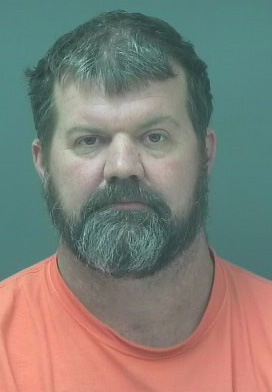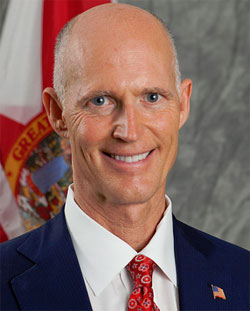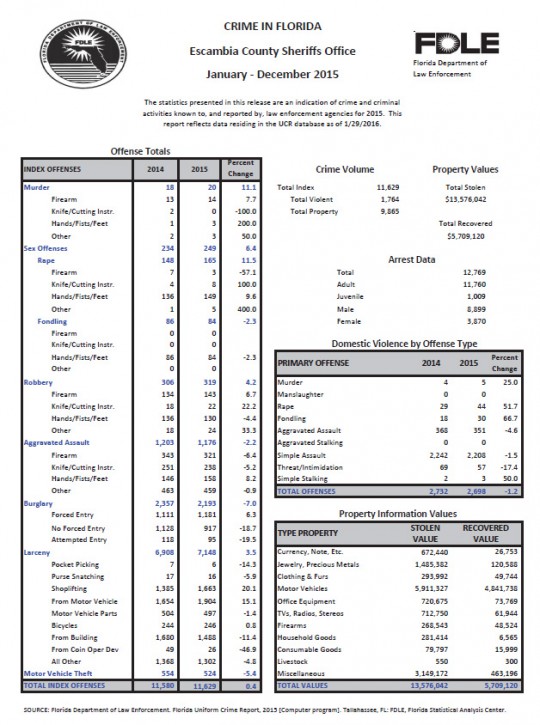Farm Share Distributes 35K Pounds Of Food To Tornado Victims
February 28, 2016
Farm Share partnered with Sen. Greg Evers, Rep. Doug Broxson, Rep. Mike Hill, and Rep. Clay Ingram for a disaster relief food distribution Saturday for the victims of an EF-3 tornado in Pensacola. Over 35,000 pounds of food, plus clothing and supplies were distributed at the Hillcrest Baptitst Church Spanish Trail campus on Spanish Trail Road. Photos for NorthEscambia.com, click to enlarge.
Crime Stats Hold Steady In Escambia County
February 28, 2016
Crimes stats in Escambia County were relatively stable from 2014 to 2015, according to data from the Escambia County Sheriff’s Office.
Total indexed crimes reported increased 0.4 percent from 11,580 to 11,629 from 2014 to 2015. Indexed crimes include murders, sex offenses, robberies, assaults, burglaries, larceny and motor vehicle thefts.
The violent crime rate increased by 0.2 percent from 1761 to 1764 and property crimes increased 0.5 percent from 11,580 to 11,629. In 2015, the population in Escambia County also grew by 2,737 people, according to the Sheriff’s Office.
The ECSO pointed out the clearance rate (up 7.5 percent), number of arrests (up 8.8 percent), and violent crime arrests (up 12.8 percent) also increased. There were 18 murders in 2014, with 20 reported in 2015 by the Escambia County Sheriff’s Office.
There were slight increases in sex offenses (6.4 percent), robberies (4.2 percent), larcenies (3.5 percent). But there was a decrease in the number of aggravated assaults (-2.2 percent), burglaries (-7.0 percent) and motor vehicle thefts (-5.4 percent) from 2014 to 2015. Since 2009, violent crimes have dropped by 21.5 percent, according to the ECSO.
There was $13.6 million worth of property stolen in 2015, or which $5.7 million worth was recovered.
“The Escambia County Sheriff’s Office is proud these numbers have maintained and takes any crime committed seriously. Those who choose to break laws in Escambia County will face the proper consequences,” the department said in a statement published on Facebook.
The stats are reported each year to the Florida Department of Law Enforcement for an annual report.
Manna, Rotary Clubs Team Up To Create 77,500 Meals For The Hungry
February 28, 2016
 Over 950 members of the Combined Rotary Clubs of Pensacola (CROP) and their guests worked with Manna Food Pantries Saturday to help feed their neighbors in the Fifth Annual Rotary Against Hunger Project. They donated 162 lbs of food, $3,712, and made 25,000 meal packets.
Over 950 members of the Combined Rotary Clubs of Pensacola (CROP) and their guests worked with Manna Food Pantries Saturday to help feed their neighbors in the Fifth Annual Rotary Against Hunger Project. They donated 162 lbs of food, $3,712, and made 25,000 meal packets.
“The Rotary Against Hunger project has become a critical part of our ability to meet the needs of the hungry throughout the year in Escambia and Santa Rosa counties,” said Manna Executive Director DeDe Flounlacker,. “This project provides much needed food during the Winter and early Spring when donations are always low, and need is always high. Last year, we provided assistance to 20,303 people, including 6,853 children. These are your neighbors and mine – folks who are the working poor, grandparents raising their grandchildren, moms and dads who do not have enough money to pay their bills and buy food for their families. Thanks to Rotary, thousands of people will be helped this year through this gift of nutritious food.”
Their hard work is enough to provide 77, 551 nutritious meals to those in need, according to Manna.
Courtesy photos for NorthEscambia.com, click to enlarge.
ECUA Works To Clean Up Northpointe Subdivision
February 28, 2016
ECUA was out in force with over a dozen trucks in the Northpointe subdivision early Saturday cleaning up tornado debris at no charge to residents. Courtesy photo for NorthEscambia.com, click to enlarge.
Northview NJROTC Finds Third Place In UWF Orienteering Competition
February 28, 2016
The Northview NJROTC team took third place at the University of West Florida Saturday in orienteering – a competition requiring navigational skills using a map and compass plus physical and mental fitness. Courtesy photo for NorthEscambia.com, click to enlarge.
Florida Gov’t Weekly Roundup: Sitting, Waiting, Wishing
February 28, 2016
Lawmakers, reporters and lobbyists spent much of the week waiting for talks between House and Senate leaders to lead to a deal on budget “allocations” — the area-by-area breakdown on where the state will spend around $80 billion in the year that begins July 1.
 Word of the deal finally came late Friday afternoon, leading to another waiting game — for the meetings of budget conference committees that will decide how to actually spend the money in each area.
Word of the deal finally came late Friday afternoon, leading to another waiting game — for the meetings of budget conference committees that will decide how to actually spend the money in each area.
In the meantime, supporters of other legislation are trying to working out the divisions between the two chambers on bills big and small. And even as the two sides are drawing together on some issues, like a fix for the death-penalty system ruled unconstitutional by the U.S. Supreme Court, they remain far apart on others.
So, like Jack Johnson in his song a decade ago, everyone at the Capitol appears to be sitting, waiting, wishing. There are two weeks to see if those wishes become reality.
LET’S MAKE A DEAL
The closing days of the session mean it’s time to strike bargains. And lawmakers either made agreements or moved in that direction on many of the key issues of the session.
The Senate pushed to the floor a bill that would fix a fundamental flaw with the state’s death-penalty sentencing system, which would allow the state to restart its capital punishment process.
On Thursday, the Senate Appropriations Committee amended the chamber’s death-penalty bill to align it with a compromise already OK’d by the House in the wake of a U.S. Supreme Court decision striking down the state’s sentencing scheme.
The committee’s 12-6 approval of the measure (SB 7068) virtually guaranteed that lawmakers will send a bill to Gov. Rick Scott before the end of the legislative session March. 11.
The ruling dealt with the sentencing phase of death-penalty cases after defendants are found guilty, and it focused on what are known as aggravating circumstances that must be determined before defendants can be sentenced to death. A 2002 U.S. Supreme court ruling, in a case known as Ring v. Arizona, requires that determinations of such aggravating circumstances must be made by juries, not judges.
But much of the debate in Florida has focused on whether to require a unanimous decision from juries in order to administer the death penalty. The plan working its way through the Legislature now would require jurors to unanimously find that at least one aggravating factor exists before a defendant can be eligible for a death sentence. At least 10 jurors would have to recommend death for the sentence to be imposed.
“Why don’t we expect unanimity when a life is at stake, when in fact we expect unanimity in other matters before the court?” asked Senate Minority Leader Arthenia Joyner, a Tampa Democrat and lawyer. “I know that ultimately we’ll probably end up back before the Supreme Court on this issue, because the way I see it, the trend is toward unanimous jury verdicts.”
Senate Criminal Justice Chairman Greg Evers, the bill’s sponsor, said the 10-2 recommendation was a compromise with the House.
Less consequential compromise discussions were also underway. The House on Wednesday overwhelmingly approved a bill that would revamp the state’s business incentives process. While lawmakers were still dealing with how much money to devote to the cause, the bill (HB 1325) dealt with one of the bargaining chips in budget negotiations.
The House voted 79-39 to approve the bill, with a mixture of Republicans and Democrats on each side. Among the opponents were House Appropriations Chairman Richard Corcoran, R-Land O’ Lakes, and House Economic Affairs Chairman Jose Oliva, R-Miami Lakes.
The bill approved by the House does not specify a level of funding, but it would revamp the process of awarding incentives. Rep. Jim Boyd, the Bradenton Republican handling the legislation, said the bill includes reforms and would help create jobs.
“We’re not giving away tax dollars,” Boyd said. “We’re investing in our communities.”
But some opponents harshly criticized the bill, calling incentives corporate welfare and saying the state would be better off investing in programs such as education.
There was also a continuing push to agree on approving a gambling compact between the state and the Seminole Tribe. House Finance and Tax Chairman Matt Gaetz, R-Fort Walton Beach, began crafting changes that would match up a House gambling proposal with an even more-expansive Senate bill.
But aligning the two packages may not be enough to keep the measure rolling in the Senate.
The House’s plan currently complements an agreement, called a “compact,” with the Seminole Tribe, struck by tribal leaders and Gov. Rick Scott. Under the compact signed in December, the tribe would be allowed to add craps and roulette to its casino operations in exchange for $3 billion in payments to the state over seven years.
Scott’s agreement with the tribe would also open the door for slots at the Palm Beach Kennel Club and at a new facility in Miami-Dade County, items included in the House plan.
But Senate leaders remained skeptical about the future of their chamber’s plan, with time running out before the March 11 scheduled end of the legislative session.
“I don’t know how we unwind it. I think it ends up sitting in committee,” Senate Majority Leader Bill Galvano, R-Bradenton, told The News Service of Florida on Wednesday. Galvano was instrumental in hashing out a deal with the Seminoles in 2010.
BRIDGES TOO FAR?
Other bills — mostly legislation from the House facing long odds in the Senate — seemed on the edge of ending their legislative journeys. The House passed a constitutional amendment Wednesday that would limit Florida appellate court judges and Supreme Court justices to two full terms, but it was widely seen as dead in the Senate.
Supporters of the measure argued that it would provide new blood to the judiciary and prevent governors from using their power to appoint judges — who must run in merit-retention elections every six years — to pack the courts.
“Because of our system of the governor appointing, our system allows for abuse of that gubernatorial privilege, where a governor can appoint very young members of the Bar…that then serve a very long time, in my opinion, in that important policymaking position,” said Rep. John Wood, a Winter Haven Republican who sponsored the proposal.
But Democrats noted that the proposal followed years of efforts to overhaul the Supreme Court amid a series of significant legal defeats for Republican leaders. The court’s more-liberal majority — including the three longest-serving justices — has emerged as the last roadblock in state government for the GOP, which controls the Legislature, all three Cabinet positions and the governor’s mansion.
“If you were to pick a sport, any sport at all, and your team is losing game after game, I am of the belief that your first response should be to practice more, to train more, perhaps even develop better techniques,” said Rep. Evan Jenne, D-Dania Beach. “What you shouldn’t do is complain about the referees and demand new ones.”
Meanwhile, a proposal to allowing “fracking” in Florida stalled in the Senate Appropriations Committee, though a procedural move kept the measure alive.
The committee on Thursday voted 10-9 against the measure (SB 318), filed by Sen. Garrett Richter, R-Naples. Sen. Lizbeth Benacquisto, R- Fort Myers, then moved to reconsider the bill, a procedural move that kept it alive.
The bill would set up a state permitting process for fracking, a method of drilling that involves injecting water, sand and chemicals underground to create fractures in rock formations, allowing natural gas and oil to be released.
Among other things, the bill would require companies to inform the state Department of Environmental Protection of chemicals they inject into the ground, although with some restrictions. Also, the bill would set aside $1 million for a study on the impact of fracking, with a temporary moratorium until the study is completed and the Legislature can act.
“A study removes the emotion and permits science to drive the issue,” Richter said. “I want science driving the issue.”
Opponents, though, were still optimistic after Thursday’s vote.
“There’s a small chance this could come back, but it’s all but dead,” Sierra Club Florida lobbyist Dave Cullen said. “I don’t think the legislators have the stomach for this bill. Voters will remember fracking at the polls.”
PRIMARY COLORS
Even as the legislative session charged ahead, the political season was in full swing, as Florida’s winner-take-all presidential primary on March 15 drew closer. Lending a little bit of clarity to the crowded field was the withdrawal of former Gov. Jeb Bush, which left the state with one favorite son: U.S. Sen. Marco Rubio.
“Most Floridians, at least in the political world, supported Governor Bush and now, I suppose, will endorse Marco Rubio,” said J.M. “Mac” Stipanovich, a lobbyist and longtime Bush adviser.
A few days after Stipanovich said that, Rubio rolled out the endorsements of more than 80 high-profile Florida Republicans, including Lt. Gov. Carlos Lopez-Cantera, Chief Financial Officer Jeff Atwater, Agriculture Commissioner Adam Putnam and state House Speaker Steve Crisafulli, R-Meritt Island.
Not on the list was Gov. Rick Scott, who has largely steered clear of taking sides in the presidential primary. But Scott has had kind words for real estate tycoon Donald Trump, the GOP front-runner, and that led to speculation from a Washington Post political blogger that Scott could be on the mogul’s short list for vice president.
Scott shrugged off the rumors.
“What I’m focused on is my job here,” Scott told a television reporter after speaking at the Take Stock for Children breakfast at the Double Tree Hotel in Tallahassee.”I’ve got three years left in this job.”
The latest poll still showed Trump in front in the Sunshine State. A survey from Quinnipiac University showed Trump with 44 percent of the vote among likely primary voters, to 28 percent for Rubio. U.S. Sen. Ted Cruz of Texas had 12 percent, Ohio Gov. John Kasich drew 7 percent and physician Ben Carson claimed 4 percent.
“If Sen. Rubio can’t win in his own home state, it is difficult to see how he can win elsewhere,” Peter Brown, assistant director of the poll, said in a prepared statement accompanying the survey results
Rubio’s campaign insisted that the senator would win his home state and with it, 99 delegates — almost one twelfth of the number necessary to claim the GOP nomination.
STORY OF THE WEEK: As negotiations continued on the budget, lawmakers began moving towards resolution on other issues with time running out on the 2016 legislative session.
QUOTE OF THE WEEK: “Once again, you’re loading it down as if that carrot is going to be enough to get us to swallow a stick, and I’m not swallowing the stick today.”—Rep. Joe Geller, D-Aventura, on a pensions bill that combined measures Democrats like and dislike.
by Brandon Larrabee, The News Service of Florida
Jay Man Arrested On Multiple Child Porn Counts
February 27, 2016
A Jay man was arrested Friday on over two dozen child porn charges by agents with the Florida Department of Law Enforcement.
 Ivan Jarrett Hendricks, 47, was charged with 25 counts of possession of child pornography and booked into the Santa Rosa County Jail without bond. His arrest came after FDLE agents executed a search warrant at Hendricks’ residence at 6026 Tractor Trail in Jay on Friday and located a tablet that contained child pornography files.
Ivan Jarrett Hendricks, 47, was charged with 25 counts of possession of child pornography and booked into the Santa Rosa County Jail without bond. His arrest came after FDLE agents executed a search warrant at Hendricks’ residence at 6026 Tractor Trail in Jay on Friday and located a tablet that contained child pornography files.
Files included 25 movies with children as young as four, according to an arrest affidavit. The investigation originated from a National Center for Missing and Exploited Children tip that involved the upload of child pornography videos to an unspecified location on December 5, 2015.
The case will be prosecuted by the Office of the State Attorney, First Judicial Circuit.
New Structure Damage Numbers Show Extent Of Century Tornado
February 27, 2016
New damage assessment totals for the Century tornado were released Friday afternoon, showing even more damage and destruction than originally tallied along the twister’s 16.5 mile path.
The February 15 tornado, rated as an EF-3 with winds over 150 mph, destroyed 52 structures in unincorporated Escambia County and inside the town limits of Century. There were 60 structures left with major damage, and 49 with minor damage, for a total of 161 structures impacted by the storm.
The assessment number from Escambia County break down as follows:
- Destroyed
- Single Family Home: 28
- Mobile Homes: 21
- Commercial: 3
- Major
- Single Family Home: 48
- Mobile Homes: 10
- Commercial: 2
- Minor
- Single Family Home: 35
- Mobile Homes: 13
- Commercial: 1
But the most important number of all: Zero lives lost.
The Century tornado was the first EF-3 tornado to hit Escambia County in 45 years. It came just eight days before a second EF-3 tornado struck Pensacola. Preliminary numbers from the Pensacola tornado show 45 structures destroyed, 272 with major damage.
Sunny Saturday, Cold Night
February 27, 2016
Here is your official NorthEscambia area forecast:
Saturday: Sunny, with a high near 62. North wind around 5 mph becoming calm in the afternoon.
Saturday Night: Clear, with a low around 35. Southwest wind around 5 mph becoming calm.
Sunday: Sunny, with a high near 69. Light southeast wind becoming south 5 to 10 mph in the morning.
Sunday Night: Patchy fog after 3am. Otherwise, mostly clear, with a low around 46. South wind around 5 mph becoming calm in the evening.
Monday: Mostly sunny, with a high near 72. Light south wind becoming southwest 5 to 10 mph in the morning.
Monday Night: Areas of fog after 3am. Otherwise, partly cloudy, with a low around 52. South wind 5 to 10 mph.
Tuesday: Areas of fog before 8am. Otherwise, mostly sunny, with a high near 73. South wind 5 to 10 mph.
Tuesday Night: A 40 percent chance of showers and thunderstorms. Mostly cloudy, with a low around 53. South wind around 10 mph becoming northwest after midnight.
Wednesday: A 20 percent chance of showers. Mostly sunny, with a high near 64.
Wednesday Night: Mostly clear, with a low around 38.
Thursday: Sunny, with a high near 64.
Thursday Night: Partly cloudy, with a low around 44.
Friday: Sunny, with a high near 66.
Budget Outline Slashes Scott Priorities
February 27, 2016
House and Senate leaders agreed Friday to a budget outline that severely curtailed both of Gov. Rick Scott’s priorities for the coming year, slashing Scott’s tax cut plan and wiping out a business-incentives package.
The deal on “allocations” — legislative shorthand for how much money will be directed to each area of the budget — clears the way for lawmakers to begin negotiations on the details of a spending plan for the fiscal year that begins July 1. Those discussions have to wrap up by March 8 for the Legislature to finish the annual session on time.
The talks on allocations had largely centered on Scott’s call for a $1 billion tax-cut package and a “Florida Enterprise Fund” of $250 million in business incentives. The House had spread out $1 billion in tax cuts over a longer timeframe while zeroing out the incentive package. Senate leaders had countered with $250 million for the incentives and a potential $250 million in tax cuts.
In the end, lawmakers agreed to $400 million in tax cuts in the current year and no money for the Florida Enterprise Fund.
 Scott’s office blasted lawmakers late Friday for the decision on the incentives package.
Scott’s office blasted lawmakers late Friday for the decision on the incentives package.
“With the Legislature’s action today, there will no longer be incentive funding for major projects to come to Florida … and we are beginning the process of notifying cities across the state that there would be no funding available to help them recruit businesses if the Legislature does not take immediate action to reverse course,” Scott spokeswoman Jackie Schutz said.
Zeroing out the Florida Enterprise Fund came as a surprise after the Senate’s initial willingness to go along with the full request. In a statement issued Friday night, even House Speaker Steve Crisafulli said the House had expected to compromise.
“The Senate’s decision to meet the House on economic development funding was unexpected, but will undoubtedly be welcomed by the majority of members of the Legislature,” Crisafulli, R-Merritt Island, said. “While I firmly believe that all members of the Legislature want to see our economy grow and increase jobs in Florida, there is great bipartisan disagreement over whether our current economic incentives are the best way to achieve those goals.”
Speaking to reporters Friday, Senate Appropriations Chairman Tom Lee, R-Brandon, said the decision was the product of the need to reach an agreement on the budget.
“We’re working against a clock,” Lee said. “We’ve been up here a long time over the last 12 months, and the House and the Senate both have priorities. We have a timeframe we’re working within. We have a long-range financial outlook we’re trying to adhere to.”
Sen. Jack Latvala, a Clearwater Republican who spearheaded the push for the governor’s incentives package, would not answer questions from reporters who ran into him at the Capitol. He walked away from the reporters and said he was looking for someone from his local newspaper.
The tax-cut number also means that Scott will fall short of his promise during his 2014 re-election campaign to secure $1 billion in tax cuts over the first two years of his new term. Lawmakers agreed to cut $372.4 million in the current financial year, which ends June 30.
Lawmakers pointed out that, after Scott proposed his spending and tax-cut plan, state economists slashed nearly $400 million from estimates of how much revenue the Legislature would have to work with.
“The fact that we got as close as we did to his campaign promise, given the reality of the shortfall, is amazing, I think,” House Appropriations Chairman Richard Corcoran, R-Land O’ Lakes, said.
Lee also underscored the changing estimates.
“Those promises were made a long time ago,” Lee said. “The facts on the ground have changed. Leaders have to be willing to shift as the facts on the ground change.”
The defeats for Scott raise the possibility that the governor, who has used his line-item veto pen to slash hundreds of millions of dollars in lawmakers’ projects in the past, could retaliate after the spending plan is approved. But Corcoran shrugged off the possibility.
“He’s used the veto pen strongly in the past,” Corcoran said. “He could in all likelihood use it again.”
by Brandon Larrabee, The News Service of Florida












